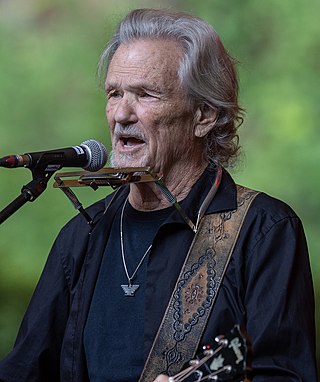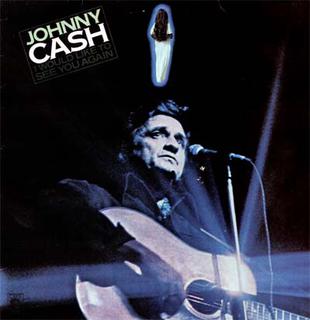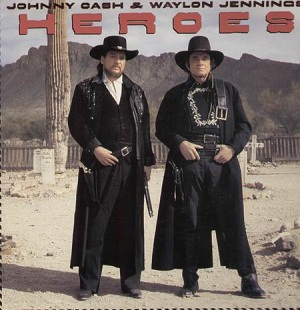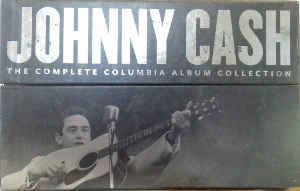
Kristoffer Kristofferson is an American retired country singer, songwriter, and actor. Among his songwriting credits are "Me and Bobby McGee", "For the Good Times", "Sunday Mornin' Comin' Down", and "Help Me Make It Through the Night", all of which were hits for other artists.
Outlaw country is a subgenre of American country music created by a small group of iconoclastic artists active in the 1970s and early 1980s, known collectively as the outlaw movement, who fought for and won their creative freedom outside of the Nashville establishment that dictated the sound of most country music of the era. Willie Nelson, Waylon Jennings, Johnny Cash, Kris Kristofferson, and David Allan Coe were among the movement's most commercially successful members.
Lincoln Wayne "Chips" Moman was an American record producer, guitarist, and songwriter. He is known for working in R&B, pop music and country music, operating American Sound Studios and producing hit albums like Elvis Presley's 1969 From Elvis in Memphis and the 1985 debut album for The Highwaymen. Moman won a Grammy Award for co-writing "(Hey Won't You Play) Another Somebody Done Somebody Wrong Song", a 1975 hit for B.J. Thomas.

Highwayman is the first studio album released by country supergroup The Highwaymen, comprising Kris Kristofferson, Johnny Cash, Waylon Jennings and Willie Nelson. Highwayman, released through Columbia Records in 1985, was the group's first and most successful album.

The Highwaymen were an American country music supergroup, composed of four of country music's biggest artists who pioneered the outlaw country subgenre: Johnny Cash, Waylon Jennings, Willie Nelson, and Kris Kristofferson. Between 1985 and 1995, the group recorded three major label albums as The Highwaymen: two on Columbia Records and one for Liberty Records. Their Columbia works produced three chart singles, including the number one "Highwayman" in 1985.

Highwayman 2 is the second studio album released by American country supergroup The Highwaymen. This album was released in 1990 on the Columbia Records label. Johnny Cash had left Columbia several years earlier, making this a "homecoming", and ultimately his final work for Columbia as the next Highwaymen album would be issued on another label.

Rainbow is the 70th album by American country singer Johnny Cash, his last for Columbia Records, released in 1985. "I'm Leaving Now", which was re-recorded 15 years later for Cash's American III: Solitary Man, was released as a single rather unsuccessfully, but the album's signature song is a cover of Kris Kristofferson's "Here Comes That Rainbow Again", which also appeared on Cash's 1995 collaboration with Kristofferson, Willie Nelson and Waylon Jennings - known as The Highwaymen - entitled The Road Goes on Forever, though it was sung solo by Kristofferson on the latter. Also included is a cover of Creedence Clearwater Revival's "Have You Ever Seen the Rain?," from Pendulum. The album also includes the song "Love Me Like You Used To," which was later recorded by fellow country singer Tanya Tucker, and became a country hit for her. Following the release of this album and a duet album with Jennings in 1986, Cash moved to Mercury Records as a result of Columbia's fading interest in his music, though he later returned to Columbia for the second Highwaymen album.

Rockabilly Blues is an album by American country singer Johnny Cash, released on Columbia Records in 1980. Highlights include "Cold Lonesome Morning," which had some minor chart success, "Without Love," by his son-in-law, Nick Lowe, and a cover of the witty "The Twentieth Century Is Almost Over." The first two of the aforementioned songs were the only singles from the album, though "Without Love" hardly enjoyed any chart success, peaking at No. 78. "The Twentieth Century is Almost Over" was re-recorded five years later by Cash and Waylon Jennings, Willie Nelson and Kris Kristofferson, collectively known as The Highwaymen, on their first album entitled Highwayman, though it was, in essence, a duet with Nelson.

I Would Like to See You Again is an album by American country singer Johnny Cash, released on Columbia Records in 1978. The title track peaked at #12 on the singles chart, while "There Ain't No Good Chain Gang" reached #2; the album itself peaked at #23. The album features a pair of duets with Waylon Jennings, one of which was the "There Ain't No Good Chain Gang" single; it was one of Cash's first collaborations with Jennings, and the two recorded songs together throughout the 1980s, including a separate album entitled Heroes. Cash and Jennings would also work together as The Highwaymen with Willie Nelson and Kris Kristofferson.

One Piece at a Time is the 54th album by American country singer Johnny Cash, released in 1976 on Columbia Records. "One Piece at a Time," which was a #1 hit, is a humorous tale of an auto worker on the Detroit assembly line who puts together a car out of parts he swipes from the plant. "Sold Out of Flag Poles" also charted as a single, reaching #29 on the country singles charts. "Committed to Parkview", a Cash original, would be re-recorded in 1985 by Cash, Waylon Jennings, Kris Kristofferson and Willie Nelson, collectively known as The Highwaymen, on their first album, Highwayman; it is one of the few country songs sung from the perspective of a patient at a mental hospital.

Heroes is a duet studio by American country music singers Johnny Cash and Waylon Jennings, released on Columbia Records in 1986.

Who's to Bless and Who's to Blame is the sixth solo album by Kris Kristofferson, released in 1975 on Monument Records. Its title track is quoted in the Johnny Cash song "The Man Comes Around" from the 2002 album of the same name. The song "Stranger" was covered as a duet by Johnny Duncan and Janie Fricke, and their version reached #4 on the U.S. country chart in 1976.

WWII is a duet album by Waylon Jennings and Willie Nelson, released on RCA Victor in 1982.

Nashville Rebel is a box set by Waylon Jennings, released on RCA Nashville through Legacy Recordings in 2006. According to Allmusic's Stephen Thomas Erlewine, it is "the first comprehensive, multi-label Waylon Jennings retrospective ever assembled," comprising ninety-two songs recorded between 1958 and 1994, with selections from the majority of the singer's recording career. The first track of the box set is the Buddy Holly-produced "Jole Blon," released in 1958, while the last is "I Do Believe," a song produced by Don Was that was included on The Highwaymen's 1995 release, The Road Goes on Forever. The other material on the box set covers Jennings' career chronologically, with songs ranging from his years on RCA's roster to later compositions from his short-lived stay at Epic Records; it ignores, however, the tracks from Jennings albums released on independent labels. The majority of the singer's charting singles are included in the package, as are collaborations such as "Mamas Don't Let Your Babies Grow Up to Be Cowboys" with Willie Nelson and "Highwayman" with The Highwaymen. A notable addition is the previously unreleased "The Greatest Cowboy of Them All," a 1978 duet with Johnny Cash which was later recorded by Cash alone for A Believer Sings the Truth (1979) and The Mystery of Life (1991); two others, "It's Sure Been Fun" and "People in Dallas Got Hair," had never been released in the United States. Nashville Rebel was released on four CDs, with a 140-page booklet and liner notes by Rich Kienzle and Lenny Kaye.
"Highwayman" is a song written by American singer-songwriter Jimmy Webb about a soul with incarnations in four different places in time and history: as a highwayman, a sailor, a construction worker on the Hoover Dam, and finally as a captain of a starship. The song was influenced by the real-life hanged highwayman Jonathan Wild. Webb first recorded the song on his album El Mirage, released in May 1977. The following year, Glen Campbell recorded his version on his 1979 album Highwayman.

The Complete Columbia Album Collection is a box set by country singer Johnny Cash, released posthumously in 2012 on Columbia Records and Legacy Recordings.
"Silver Stallion" is a song written by Lee Clayton and originally released by him on his 1978 album Border Affair.
"Born and Raised in Black and White" is a song written by Don Cook and John Barlow Jarvis, and originally recorded by The Highwaymen on their 1990 album Highwaymen 2. Mark Collie covered it for his 1991 album Born and Raised in Black & White, and Brooks & Dunn on their 1998 album If You See Her.

"American Remains" is a song written by Rivers Rutherford and originally recorded by the Highwaymen for their 1990 album Highwaymen 2. The song follows the stories of 4 historically fictional men in a similar vein to their cover of "Highwayman". Unlike in Highwayman, however, none of the characters are implied dead; their legacies are instead emphasized.














